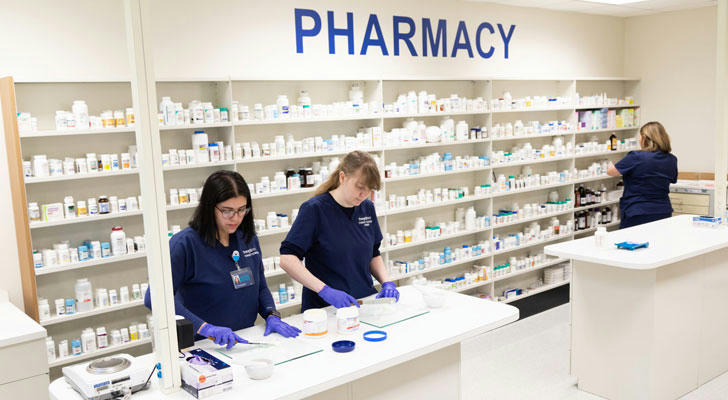Prescription for Success: Your Complete Guide to Becoming a Pharmacy Technician
A Pharmacy Technician is a healthcare professional who works under the supervision of pharmacists to prepare, dispense, and manage medications in pharmacies, hospitals, and clinics. Pharmacy technicians play a crucial role in ensuring that patients receive the correct medications, in the right dosages, and with proper instructions for use.

What is a Pharmacy Technician?
Their responsibilities include measuring, mixing, and labeling medications, processing prescriptions, maintaining inventories, and assisting customers with medication1.related questions. Pharmacy technicians work in a variety of settings, such as retail pharmacies, hospitals, long1.term care facilities, and mail1.order pharmacies.
With the increasing complexity of medications and growing demand for pharmaceutical services, pharmacy technicians are essential to maintaining the smooth operation of pharmacies and ensuring patient safety.
How to Become a Pharmacy Technician?
Becoming a Pharmacy Technician typically involves the following steps:
- Complete a Pharmacy Technician Training Program
While a formal degree is not always required, many pharmacy technicians complete a 61.month to 11.year training program through vocational schools or community colleges. These programs provide in1.depth knowledge of pharmacology, pharmacy laws, medication preparation, and pharmacy practices. Some programs also offer hands1.on internships that allow students to gain real1.world experience.
- Get Certified (Optional but Beneficial)
Certification is not always required, but many employers prefer to hire certified technicians. The Pharmacy Technician Certification Board (PTCB) offers certification exams that test knowledge in areas like medication dispensing, patient safety, and pharmacy law. Becoming a Certified Pharmacy Technician (CPhT) can improve job prospects, increase earning potential, and make technicians more competitive in the job market.
- State Licensure (Varies by State)
Many states require pharmacy technicians to be licensed or registered. This process may involve submitting an application, passing a background check, and meeting continuing education requirements. Each state has different regulations, so it's important to check the specific licensing requirements for your area.

Career Prospects and Job Outlook
The career outlook for pharmacy technicians is strong, with a 4% job growth projection from 2021 to 2031 according to the U.S. Bureau of Labor Statistics (BLS). This growth is fueled by the aging population, which increases the demand for prescription medications, and the expanding role of pharmacy technicians in both retail and healthcare settings.
In addition to traditional pharmacy roles, pharmacy technicians have the opportunity to specialize in areas such as oncology, compounding (mixing medications), or nuclear pharmacy. Specialization can offer higher salaries and career advancement opportunities.
Real1.Life Case Studies
- Case Study: Sarah – From Pharmacy Assistant to Certified Technician
Sarah began her career as a pharmacy assistant in a local retail pharmacy, where she managed inventory and assisted customers with basic medication inquiries. After a year, she decided to pursue certification to enhance her skills and qualifications. Sarah enrolled in a pharmacy technician training program and passed the PTCB exam to become a Certified Pharmacy Technician (CPhT). She now works as a senior pharmacy technician, responsible for preparing prescriptions and overseeing the work of new technicians. "Certification has opened doors for me, and I’m now more confident in my role," says Sarah. "I’ve even considered becoming a pharmacy manager in the future."
- Case Study: Mark – Specializing in Oncology Pharmacy
Mark started his career as a pharmacy technician in a community pharmacy. After several years of experience, he became interested in the specialized field of oncology pharmacy, which involves preparing chemotherapy medications and providing care to cancer patients. Mark completed additional training in oncology pharmacy and now works at a cancer treatment center. "Working with oncology medications requires precision and knowledge, but it’s incredibly rewarding," says Mark. "I get to make a real impact on patients’ lives during their treatment journey."
- Case Study: Tiffany – Advancing in a Hospital Pharmacy
Tiffany has worked as a pharmacy technician for over five years, initially starting in a retail pharmacy before transitioning to a hospital pharmacy. "Hospital pharmacies are much more complex, and I enjoy the challenges," Tiffany explains. In her role, Tiffany works closely with pharmacists to manage medication inventories, prepare intravenous medications, and assist in the care of patients with complex conditions. She is also working toward earning her Certified Compounding Pharmacy Technician (CPhT) certification. "The hospital setting allows me to learn new things every day, and I’m excited about pursuing further education and specialization," says Tiffany.

Why Choose a Career as a Pharmacy Technician?
Here are some compelling reasons to pursue a career as a Pharmacy Technician:
Job Stability: With the growing demand for prescription medications and healthcare services, pharmacy technicians are in high demand. The profession is expected to grow steadily, providing long1.term job stability.
Short Training Period: Pharmacy technician programs are relatively short, typically ranging from 6 months to a year, allowing you to enter the workforce quickly.
Opportunities for Specialization: Pharmacy technicians can specialize in fields such as oncology, nuclear pharmacy, or sterile compounding, which can lead to higher pay and more career opportunities.
Work in Various Settings: Pharmacy technicians can work in a wide range of settings, including retail pharmacies, hospitals, outpatient clinics, and pharmaceutical companies, providing diverse career paths.
Potential for Advancement: Experienced pharmacy technicians who pursue further education or certification can move into more senior roles, such as pharmacy manager or director of pharmacy services.
Conclusion
A career as a Pharmacy Technician is an excellent choice for those interested in healthcare but looking for a relatively short path to employment. With strong job prospects, opportunities for specialization, and the ability to work in diverse settings, this profession offers both job stability and personal fulfillment. Whether you're working in a community pharmacy, hospital, or a specialized field like oncology, the role of a Pharmacy Technician is both rewarding and essential to patient care.
